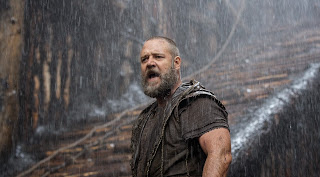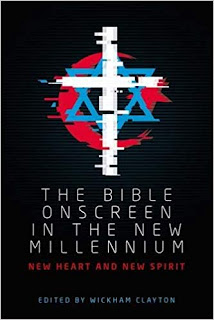Noah (2014)

In comparison to the majority of Bible movies, films about Noah have tended to take a more creative approach to telling the story. Michael Curtiz's 1929 Noah's Ark wraps the main story up in a "modern" day train crash story; thimbles and pipe cleaners lend a distinct charm to Disney's 1959 stop motion short of the same name; and the 1999 TV film, also of the same name, bizarrely combines the story of Noah with that of Lot.
Darren Aronofsky's Noah (2014), then, is hardly the first film about Noah to take a more creative approach. His is a mythic take, on a story which permeated so many different ancient cultures. Whilst this version is clearly an adaptation of the Jewish version of the story - and whilst Aronofsky himself is an atheist, his Jewish background has clearly been influential - the fantastical approach he has taken with his subject matter works to evoke a story that was known to far more people groups than simply the descendants of Jacob.
Aronofsky particularly seems to revel in the fact that the Bible is often a strange book, and that few parts of it embody that 'oddness' more than Genesis. Indeed, I don't think you've really taken the Bible seriously until you acknowledge this inherent oddness. Take for example these words from the prologue to the Noah story:
"When people began to multiply...and daughters were born to them, the 'sons of God' saw that they were fair and took wives for themselves... the 'sons of God' went in to the daughters of humans, who bore children to them..." (Gen 6:1-4)And that's one of the passages that Aronofsky leaves out. Add in those making covenants by dismembering animal carcasses and perambulating between them; Lot sleeping with both his daughters on consecutive nights, and Abraham being just moments away from sacrificially chopping up his only son and you have one weird book. Of course, Genesis is not necessarily endorsing all the actions it describes. However, all too often people behave as if that the world of Genesis was broadly similar to out own, where people thought, felt and generally acted in a similar manner to the way in which we do today, despite the substantial evidence to the contrary, not least in our main source for these very stories.
What I most appreciate about Aronofsky's Noah, therefore, is that he grasps, and indeed seems to relish, this strange 'otherness'. The film was over twenty years in the making after a project at school on the subject first caught his attention. The result is probably the first Bible film to feel like a cross between Lord of the Rings, Waterworld and Mad Max. As John Wilson put it, Noah isn't so much an adaptation, as a film that uses Genesis as a "mood board" (Front Row, 2014). The resulting film posses a strangely uneven style which many have disliked, but again this is what makes the film so bizarre and so interesting.
On the surface of course, it's a biblical epic and some of the scenes that Aronofsky has created here are amongst the very best in the genre. Chief among them are the minutes leading up to the launch of the ark which, on the big screen at least, are spectacular. Noah rescues his son Ham from the descendants of Cain, escapes to the ark whilst the 'watchers' protect the ark from the on-rushing hordes, which culminates in their angelic souls spectacularly beaming back up to heaven just as the waters of the deep break forth lifting the ark up and away. Clint Mansell's score, quite different from the kind of music he has typically produced for Aronofsky, ratchets up the tension magnificently. It maybe the 21st century, but it nevertheless feels very like the moment the Red Sea parts in the 1956 version of The Ten Commandments.
But this sequence also contains exactly those elements which feel so very far away from the kind of movie that DeMille and his ilk would ever have produced. The 'watchers' are angels (the Nephilim of Gen 4) who have quite literally fallen to earth, and found as they crashed to earth that the earth, or rather its rock, has clung to their bodies. The resulting 'rock monsters' look like the kind of special effect Ray Harryhausen might have created for Jason and the Argonauts (1963). When they die defending the ark their souls are sucked back up to heaven in great beams of light that feels like something from Independence Day.
The movie's other breathtaking sequence also illustrates the diverse mix of styles that Aronofsky brings together. Shortly after the launch of the ark, Noah retells his family the story of creation accompanied by a time-lapse-styled montage portraying an evolutionary act of creation with a hint of stop-motion. The sequence ends at the Tree of Life (with all the echoes of Aronofsky's earlier The Fountain) with a glowing snakeskin wrapped around Noah's arm like tefillin straps. Throw in the lunar-esque Icelandic landscape; a cameo from Anthony Hopkins that veers a little too closely to Billy Crystal's turn in The Princess Bride; and Noah's nightmares alternating between blood underfoot and water overhead, and it's not hard to see why many dislike the film's unevenness.
The unevenness both unsettles viewers and hints at the divergent sources that lay behind the version that is cherished today. It's not that Aronofsky has pinpointed the exact cultural context of the original stories. He hasn't and clearly didn't intended to. But he has created a context where some of the questions that the text raises, and that the story's characters would have had to face, can be explored. In particular the time spent on the ark during the flood, so often skipped over in other versions of the story, turns into a dark psychological drama, as Noah feels inescapably drawn to take The Creator's work to its grimly 'logical' conclusion by ending even his own family line.
It's a film, then, that takes seriously the nature of the destruction that "The Creator" (as God is called in this version) unleashes during this story - a point that few critics seemed to appreciated. Ironically, many Christians railed against the film's portrayal of Noah as a homicidal maniac, overlooking the fact that of course the number of deaths at Noah's hands are only a fraction of those who drown in the flood sent by God. To assess this film's Noah as a psychopath is something of a miscalculation. Noah doesn't want to kill his granddaughter - and in fact ultimately he cannot - he just believes that this is what his creator is calling him to do. Noah's readiness to follow even the most horrific of his creator's commands brings him into similar territory as Abraham, sacrificing his offspring because he is convinced God wills it.
As Peter Chattaway has observed, Aronofsky's other films "often dwell on the idea that purity or perfection is impossible, and that the pursuit of these things is self-destructive." (Chattaway 2014). It's not hard to see how the filmmakers unpack similar themes in Noah. Noah's environmentalist perfectionism is such that he rebukes his child for picking a flower; his destructive obsession drives him to almost kill his grandchild. On a physical level the floodwaters have destroyed the world, but there is also huge destruction on an emotional level. Little wonder that the film's epilogue opens with Noah, alone, getting drunk on the beach. Years before this film was released Aronofsky described this as an indication of Noah's "survivor's guilt" (Aronofsky, 2007), but Noah is also continuing to agonise over the questions which dominated the film's third act. Was he was right or wrong to spare Ila's child? Has his 'compassion' ultimately doomed the world to be destroyed by humans all over again? How can he face his family given how close he came to committing such an horrific act? It's no coincidence that Aronofsky framing of Crowe's Noah repeatedly echoes the famous final shot of The Searchers (1956).
It's here that his daughter-in-law Ila's words help rehabilitate Noah, in the eyes of his family, to himself, and also, to some extent, to the viewer:
He chose you for a reason, Noah. He showed you the wickedness of man and knew you would not look away. And you saw goodness too. The choice was put in your hands because he put it there. He asked you to decide if we were worth saving. And you chose mercy. You chose love. He has given us a second chance. Be a father, be a grandfather. Help us to do better this time. Help us start again."On all three fronts the rehabilitation is only partly successful, such trauma is not easily overcome, but it does manage to leave the film on a positive note, whilst also challenging its audience to re-examine its own environmental credentials. This, then, is a more hopeful ending than Aronofsky's later mother! which suggests that this film's second chance, if it even is only a second chance, is doomed to fail and will ultimately lead The Creator to endlessly destroy and misguidedly restart the world again. Here though, the despair is not yet so overwhelming. Noah may have begun amidst environmental apocalypse (with an implied modern parallel), but it ends still offering us a fig leaf of hope, urging us to act before its too late.
===============================
Aronofsky, Darren (2007). "Just Say Noah" Interviewed by Ryan Gibley for The Guardian, 27 April. Available online - https://www.theguardian.com/film/2007/apr/27/1
Chattaway, Peter T., (2014) "Flood Theology" in Books and Culture Vol 20 No.3 (May/June 2014)
Available online - http://www.booksandculture.com/articles/2014/mayjun/flood-theology.html?paging=off
Front Row (2014) BBC Radio 4, 4 April. Available online - https://soundcloud.com/front-row-weekly/fr-kate-winslet-richard-ayoade
Labels: Genesis, Noah, Noah (2014)













0 Comments:
Post a Comment
<< Home